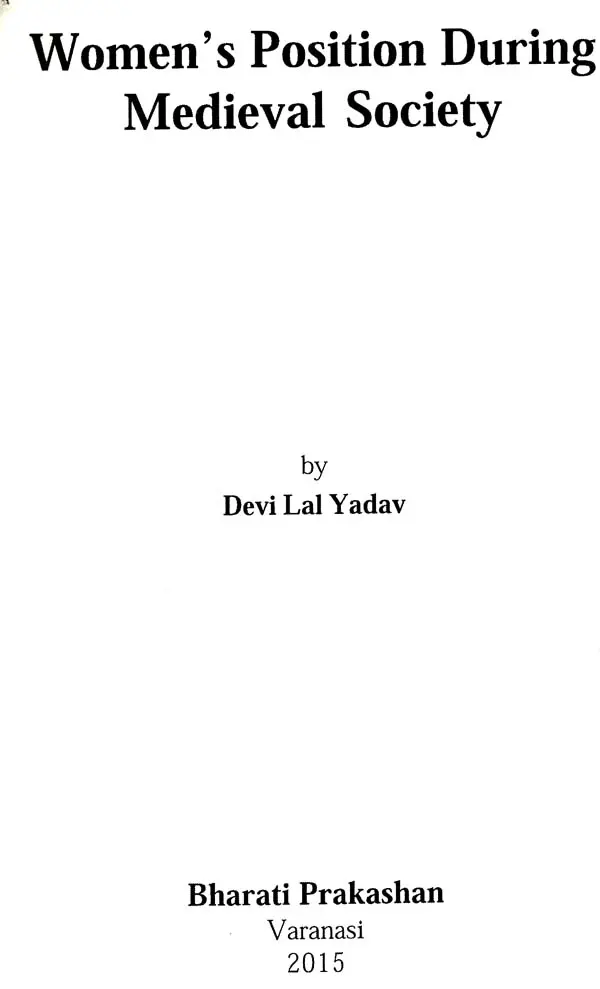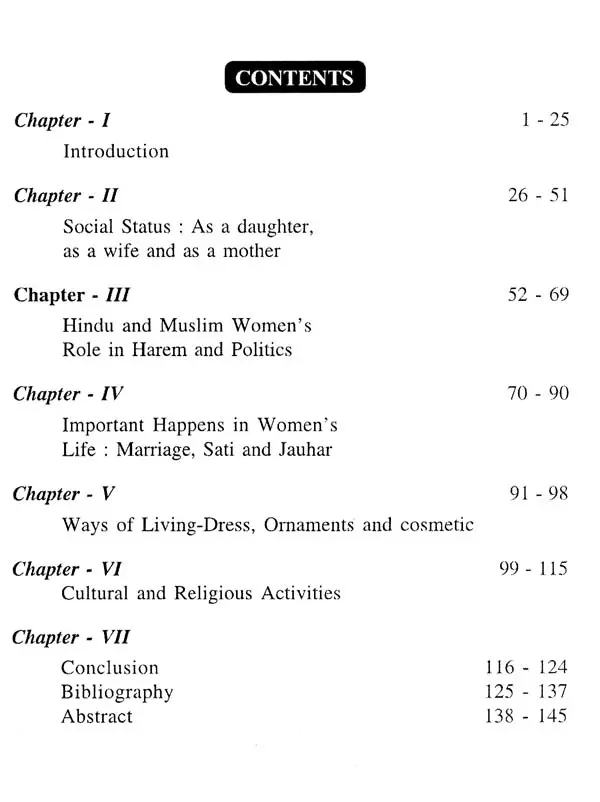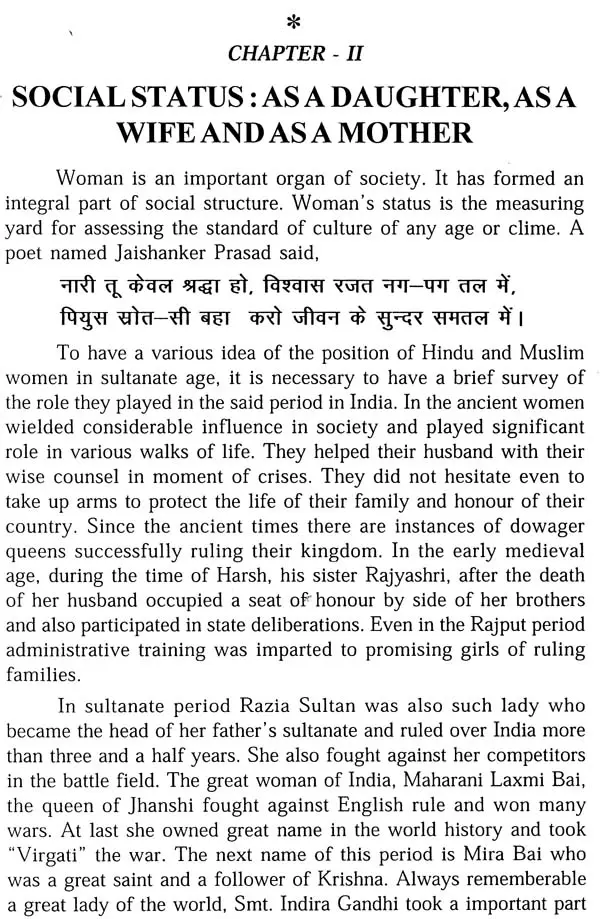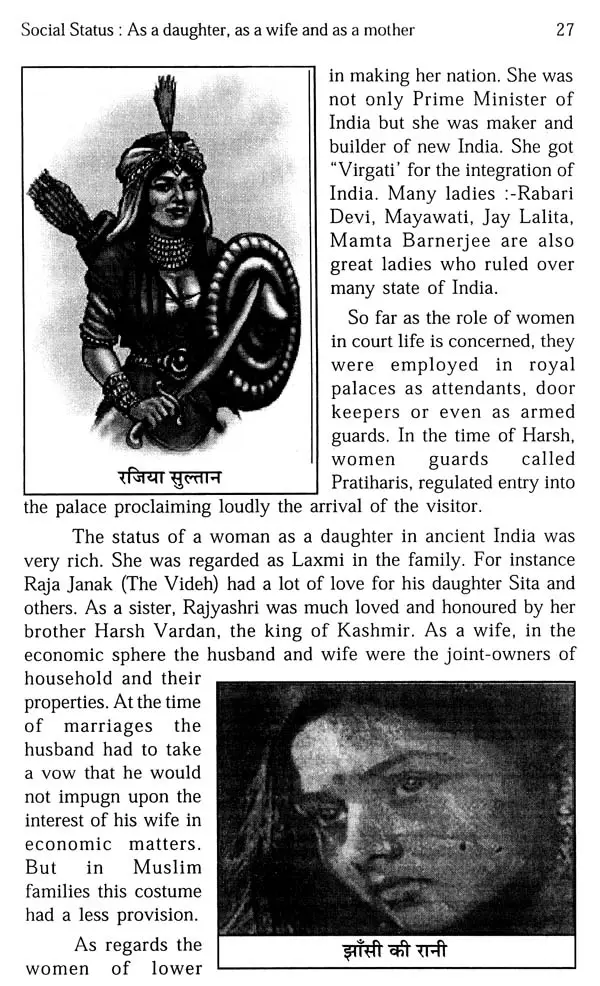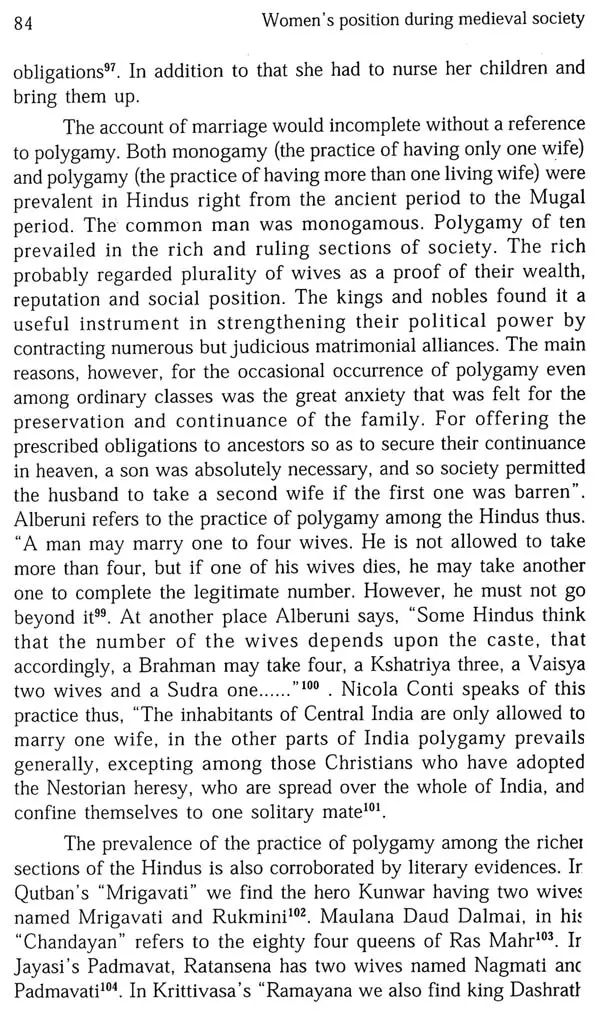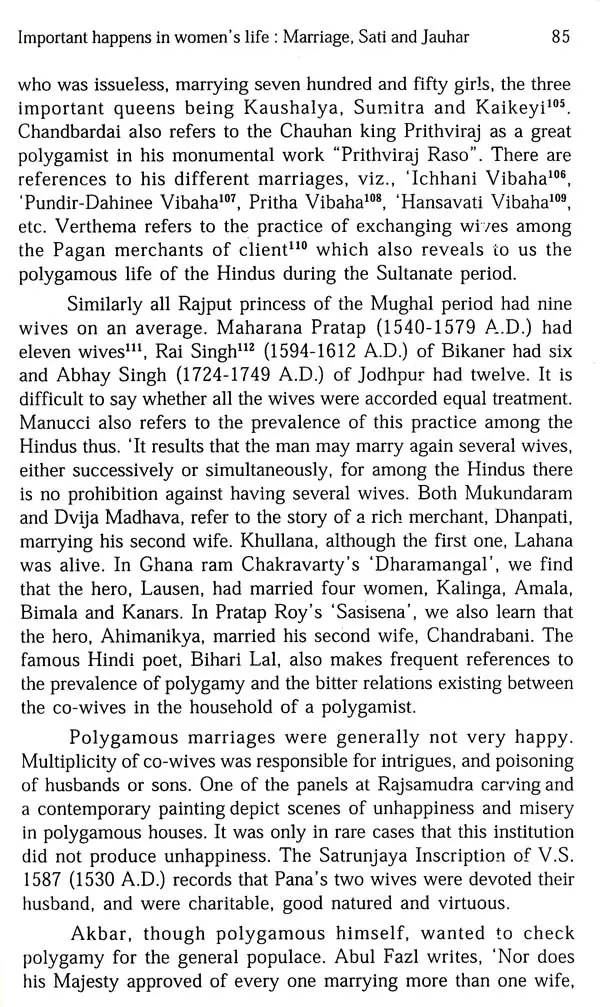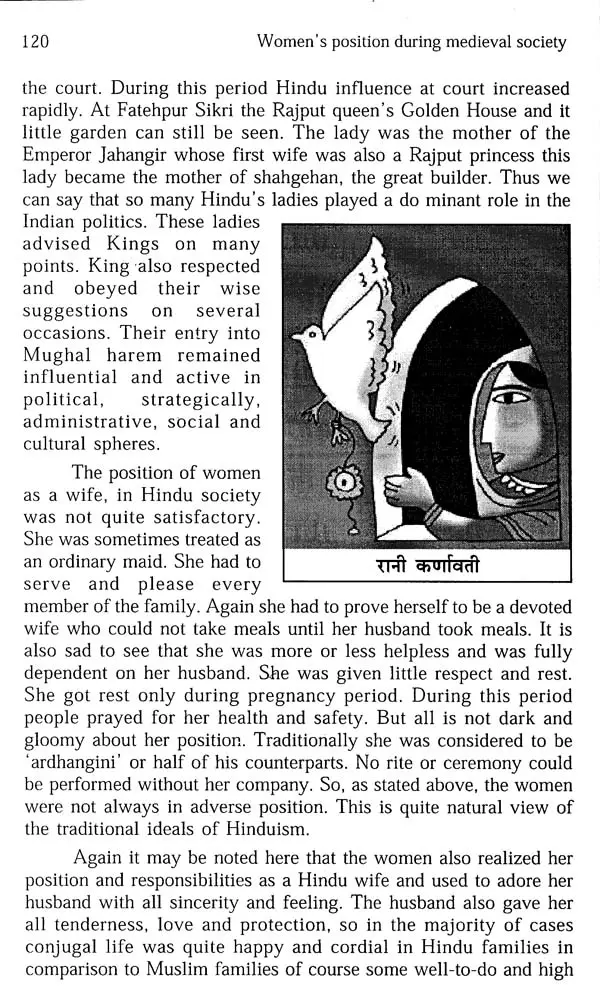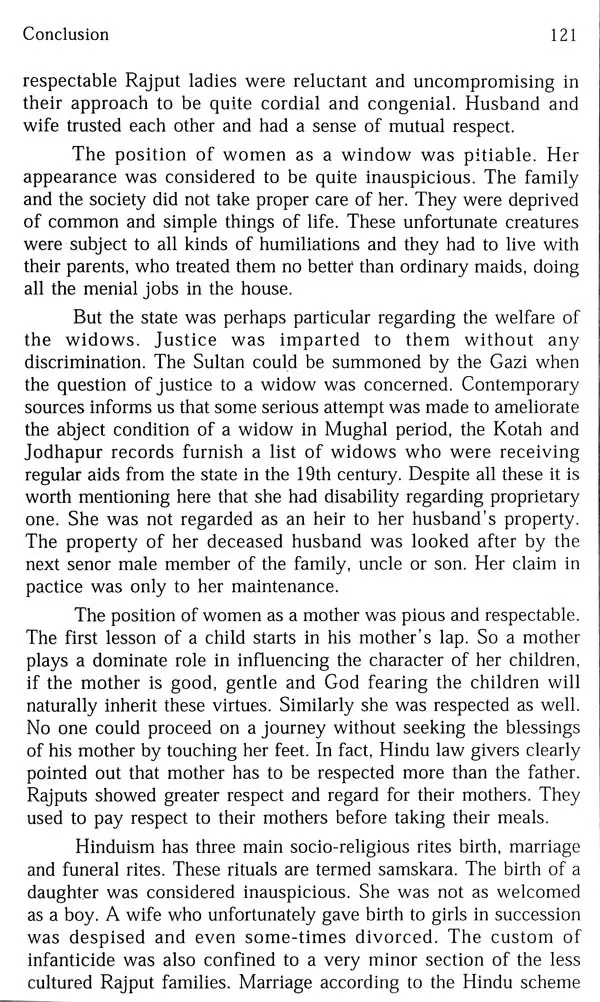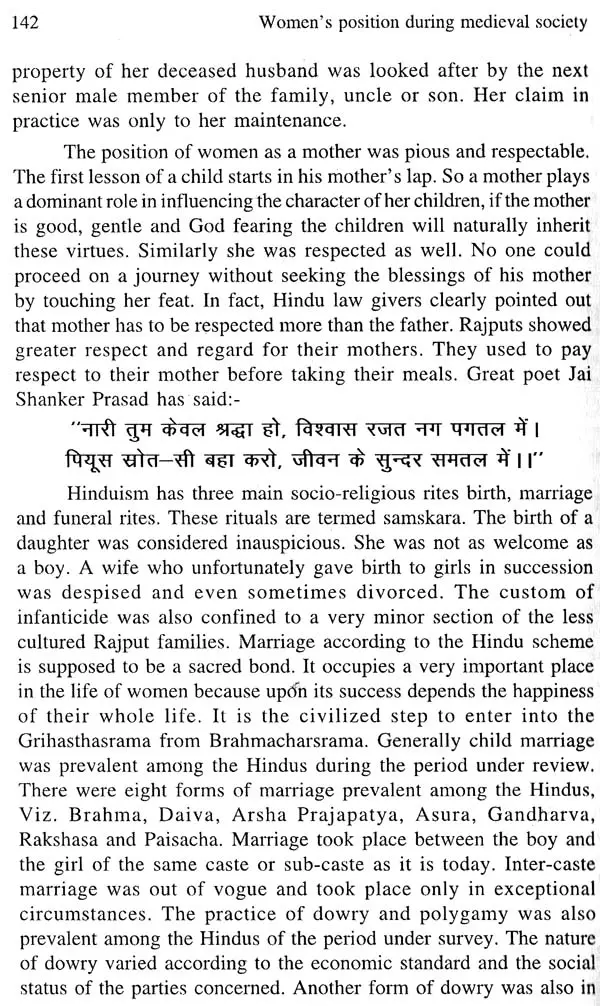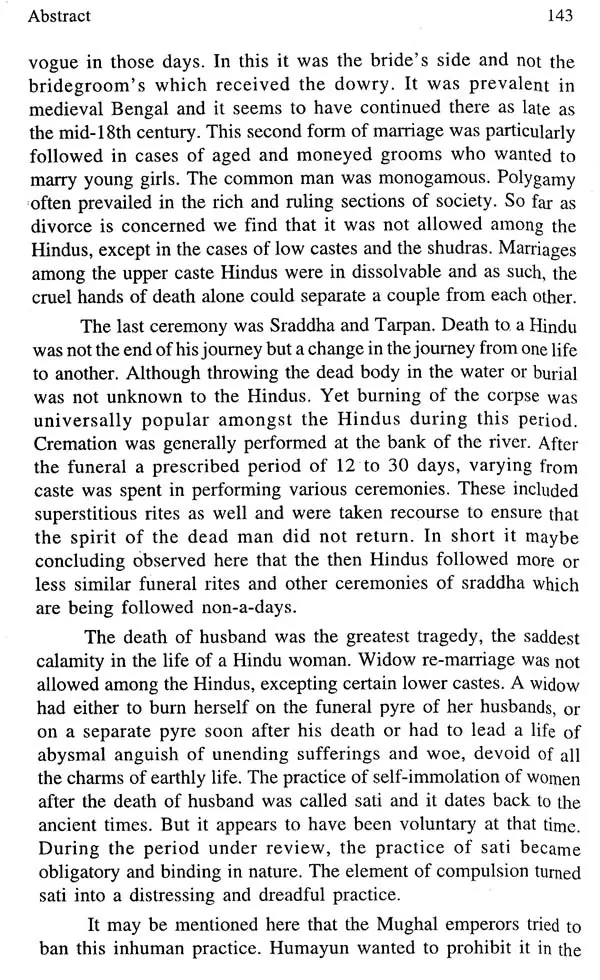
Women's Position During Medieval Society
Book Specification
| Item Code: | UAI513 |
| Author: | Devi Lal Yadav |
| Publisher: | Bharati Prakashan, Varanasi |
| Language: | English |
| Edition: | 2015 |
| ISBN: | 9789380550497 |
| Pages: | 144 (Throughout B/W Illlustrations) |
| Cover: | HARDCOVER |
| Other Details | 9.00 X 6.00 inch |
| Weight | 310 gm |
Book Description
So, I felt to study and compare their positions between yesteryears and present. I wanted to focus on the Vedic, Medieval and current status of women particularly Hindus & Muslims, in this book.
The position of women as a mother was pious and respectable. The first lesson of a child starts in his mother's lap. So a mother plays a dominant role in influencing the character of her children, if the mother is good, gentle and God fearing the children will naturally inherit these virtues. Similarly she was respected as well. No one could proceed on a journey without seeking the blessings of his mother by touching her feat. In fact, Hindu law givers clearly pointed out that mother has to be respected more than the father. Rajputs showed greater respect and regard for their mothers. They used to pay respect to their mother before taking their meals. Great poet Jai Shankar Prasad has said:
"Woman, you are only faith, trust in the silver necklace. Piyush shed the source, in the beautiful plane of life."
He joined as a Science teacher in middle school Chamainiya Yogapatti in 1977. His service as a teacher has been quite admirable and got State education award in 1992 from BEP, Govt of Bihar. Later he got National Teachers Award (President Award) in 2001 from HRD, Govt of India. Meanwhile he was also awarded with "Medini Award" by Environment and Forest Deptt., Govt. of India in 2003 for his book "Champaran Ki Nadiyan". Several other institutions also came forward to honor him with several awards Viz... Gold Medal Award, Shiksha Ratna Award, Champaran Ratna Award.
Dr. Yadav is a meticulous environmentalist and author too. His books: "Champaran Ki Nadiyan", "Jal Prabandhan" "Paryavaran Ke Geet" "Paryavaran Sanskar", "An excellent grammar and composition" and” mai champaran hun" are being loved by readers. His other books "Rivers of Bihar" and "Rivers of India" is under publication. He has successfully taken the responsibility as an editor for magazines like "Sarvodaya" and "Valmiki", from 1998 to 2011. Currently his work as a Principal is being admired by persons. Praising him we are coming forward to wish him all the very best for his future. May God bless him..
This book "Comparative Study of Position of Hindu and Muslim Women during Medieval Society (1206-1526 AD)" is a pioneer work. The author of book has gone through manuscripts, epics and secondary sources of data to depict a comparative picture of status of women in medieval India. Hinduism and Islam both have specific cultural heritage but the status of women was not very different Jauhar, Devdasi, and Harem were those tradition that has deteriorated the status of women. The politics played through social relation such as marriages. He cleverly depicted the different picture of women as in the role of wife, sister; mother etc. Author tries to explain the status of widows in society, different rituals related to different occasions has been explained beautifully.
It hoped that this book will inspire further studies and analysis of status of women in Indian society and other important emerging issues related to women.
The accounts of the foreign travelers, no doubt, constitute almost an indispensable contemporary source of Indian history, but what cannot be dispensed with, is not necessarily infallible. On the contrary, they also had their limitations. They did not know the country as a whole, rather they mostly visited the important cities and towns, and there too, their stay was very brief. As such, they generally remained aloof from the teeming millions, inhabiting the distant and secluded rural corners of this country. They were, in most cases, very inadequately informed about the history, traditions, religion and geography of this vast sub-continent. Unfamiliarity and lack of adequate knowledge about the things, Indians. often led to misunderstandings on their part. At times, they could not fully comprehend the inner significance of some of the long-established Indian customs and, as such, most of them were superficial, if not perfunctory, in their remarks about them. Besides, the accounts of these travelers often suffer from historical inaccuracies for obvious reasons. They had no easy access to the authentic chronicles of the country, and for information regarding the current events they had mostly to depend on secondary sources. Moreover, they were apt to get confused with unfamiliar foreign names, and the 17th century corruptions of Indian nomenclature probable made confusion worse confounded.
Pre-Sultanate Period and Position of Women:
The state of a society is measured by the position of female group. That how much it is well-to-do and developed. In pre-sultanate period. women had to work in various spheres. Having to know vivid ideas of position of women in pre-sultanate age it is necessary to have a brief survey of the role they played in the preceding age in India. Women along with man, from time immemorial, have formed an integral part of social structure. They were helpful in all round progress of family and society. Their status or position is measuring yard for assessing the standard of culture of any age or clime. The women had very honourable position in society in Vedic period. According to Manusmriti In the other words where there women were honoured there would be happiness and joy. In ancient period women wielded considerable influence in society and played significant role in various walks of life. They helped their husbands with their wise insel in moment of crises. They did not hesitate even to take up arms or weapons to protect the life of their family or state. For instanse Kaikaie, the wife of King Dasharath helped her husband (Dasharath) in the battle field. In the early age of medieval India, during the time of Harsha, his sister Rajyashri, after the death of her husband occupied a seat of honour by the side of her brothers and also participated in state of deliberations.
Book's Contents and Sample Pages
